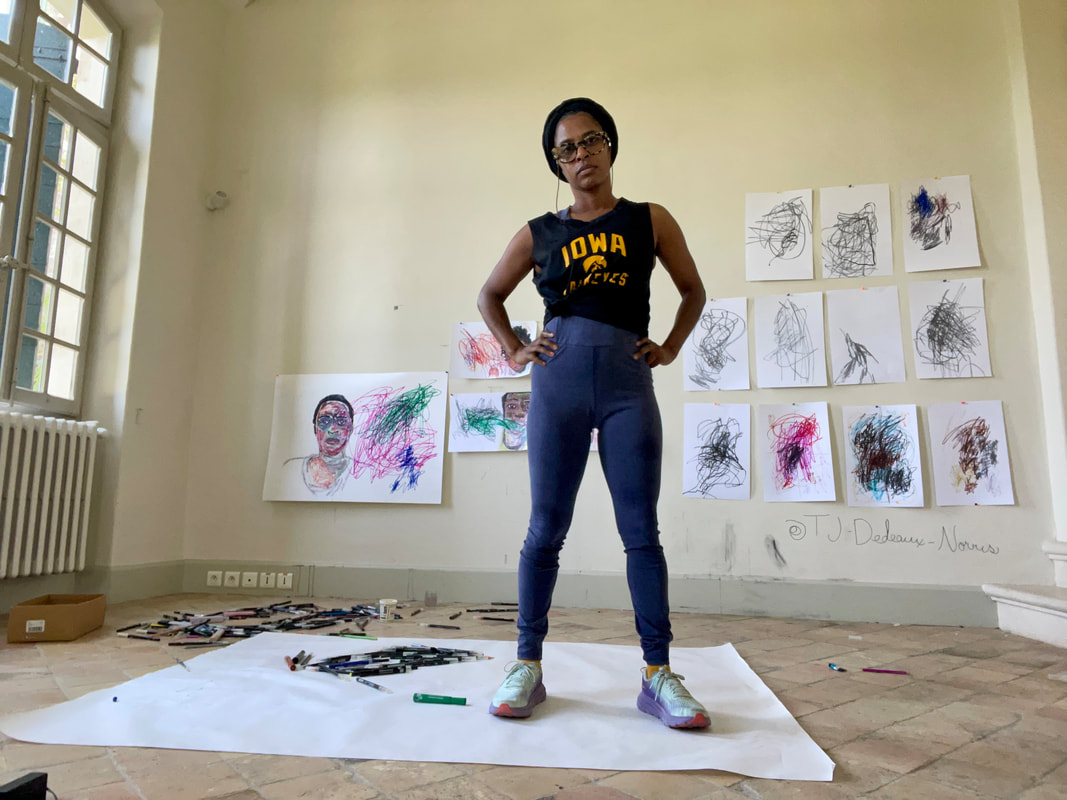Who is T.J. Dedeaux-Norris, FKA tameka jenean norris, aka Meka Jean?

My embodied practice extends beyond the studio where I develop performances, edit video, sew textiles, assemble installations, and paint into a life-wide investigation of the interformativity of individual and collective identities and how that manifests in the body and its labor over time. I experiment with physical, mental, and spiritual modalities, from boxing to chiropractic to cognitive behavioral therapy, to test their conceptual and technical impacts on my work. Here, healing becomes its own media, visceral and tangible, as I seek to reconcile the seemingly oppositional past and present - rapper and contemporary artist, sexworker and university professor, runaway and mother’s caretaker - to highlight the necessarily generative nature of difference.
I am intrigued by and committed to a practice of working my inheritance, to the agency of ‘picking up and putting down’ (to reference the Black vernacular tradition) what is given to me - from previous familial generations, but also from earlier performances of Self, from competing art histories, and from the intersecting imaginaries that impose corporeal limitations on those of my racial, gender, and class backgrounds. My inheritance includes not only the epigenetics shaped by my biological ancestors’ lived experiences - a scientific reality that fascinates me - but a broader spectrum of presumed violability and active resistance to it. I take the time to assess these inheritances and transmute them into work that defies boundaries. My work challenges the presumption of people of color and female-bodied and working-class people’s passive receptivity and subverts the economy of time. I have and take all of the time I need. In accord with the Black Feminist tradition, the only thing I cannot afford is dichotomy.
This ethos is perhaps most obvious in the development and performance of my three personas: Tameka Jenean Norris, Meka Jean, and T.J. Dedeaux-Norris. In my 2020 solo exhibition at Figge Art Museum in Davenport, IA, “T.J. Dedeaux-Norris Presents the Estate of Tameka Jenean Norris,” I laid the oldest of them, Tameka, to rest. At the entrance, viewers were met with an open casket. The exhibition of individual works became its own assemblage. My paintings, drawings, textiles, videos, and installations bled into each other, emphasizing the tension between continuity and singularity, the inseparable nature of death and birth. I draped yards-long braided cloth across, between, and above the work. A chainlink fence surrounds a collection of artifacts from my now-deceased (then-terminally ill) mother's storage - a china cabinet filled with trinkets, a small giclee of Black Jesus. The boundary serves as protection and invitation, distinguishing between the private and the public, even as its permeability admits just how inexclusive they are of each other.
I am intrigued by and committed to a practice of working my inheritance, to the agency of ‘picking up and putting down’ (to reference the Black vernacular tradition) what is given to me - from previous familial generations, but also from earlier performances of Self, from competing art histories, and from the intersecting imaginaries that impose corporeal limitations on those of my racial, gender, and class backgrounds. My inheritance includes not only the epigenetics shaped by my biological ancestors’ lived experiences - a scientific reality that fascinates me - but a broader spectrum of presumed violability and active resistance to it. I take the time to assess these inheritances and transmute them into work that defies boundaries. My work challenges the presumption of people of color and female-bodied and working-class people’s passive receptivity and subverts the economy of time. I have and take all of the time I need. In accord with the Black Feminist tradition, the only thing I cannot afford is dichotomy.
This ethos is perhaps most obvious in the development and performance of my three personas: Tameka Jenean Norris, Meka Jean, and T.J. Dedeaux-Norris. In my 2020 solo exhibition at Figge Art Museum in Davenport, IA, “T.J. Dedeaux-Norris Presents the Estate of Tameka Jenean Norris,” I laid the oldest of them, Tameka, to rest. At the entrance, viewers were met with an open casket. The exhibition of individual works became its own assemblage. My paintings, drawings, textiles, videos, and installations bled into each other, emphasizing the tension between continuity and singularity, the inseparable nature of death and birth. I draped yards-long braided cloth across, between, and above the work. A chainlink fence surrounds a collection of artifacts from my now-deceased (then-terminally ill) mother's storage - a china cabinet filled with trinkets, a small giclee of Black Jesus. The boundary serves as protection and invitation, distinguishing between the private and the public, even as its permeability admits just how inexclusive they are of each other.